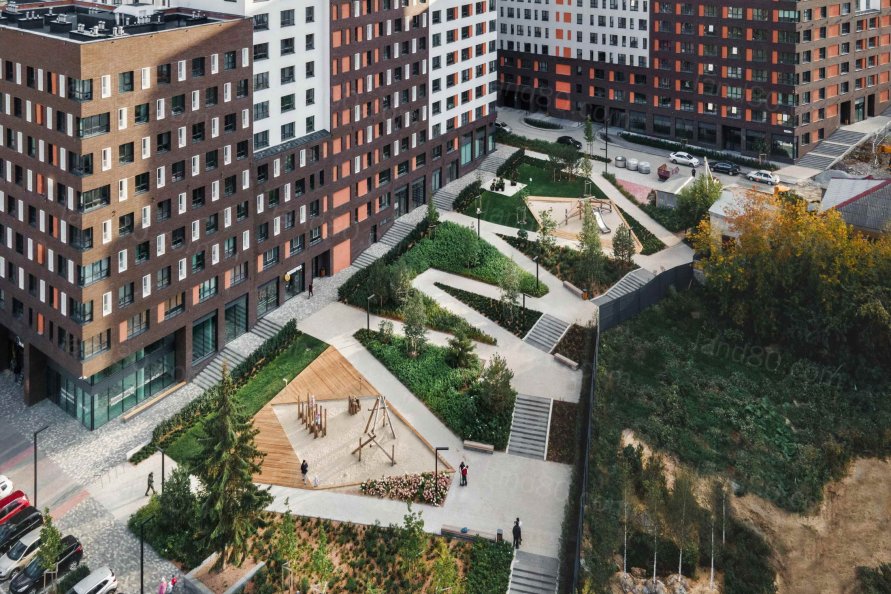Shyshymska Gorka项目是俄罗斯斯维尔德洛夫斯克地区200万居民的首府叶卡捷琳堡市南部地区Uktus的主要城市改造计划的第一阶段。这个雄心勃勃的城市方案是与荷兰KCAP建筑事务所一起为当地开发商Brusnika开发的,旨在将过去50年中以不同风格建造的破旧木制和砖制房屋与杂乱无章的公寓区混合在一起,改造成一个有凝聚力的城市结构。其目的是为当前和未来的居民提供所有必要的设施,包括大量的绿色基础设施部分,以部分弥补该地区大多数单家独户房屋周围的私人花园的损失。该计划还建立了一套同样雄心勃勃的目标,如果实现这些目标,将至少部分地使该城市的这一地区在气候上、经济上和社会上更具复原力。
Shyshymska Gorka project is the implemented first stage for a major urban transformation scheme of Uktus, the southern district of Ekaterinburg – the 2 million inhabitant capital of the Sverdlovsk region, in Russia. The ambitious urban scheme, developed together with a Dutch architectural office firm KCAP, for local developer Brusnika, sets up to transform a mix of dilapidated wooden and brick houses, lining partially dirt covered streets, with haphazard blocks of flats constructed during the last 50 years in various styles, into a cohesive urban structure. The aim is to provide all necessary amenities to current and future inhabitants, including a substantial green infrastructure component that will partially compensate for loss of private gardens that surround most of the single family houses in the area. The scheme also establishes an equally ambitious set of goals that if met, will at least partially, make this area of the city more climatically, economically and socially resilient.

该方案很好地诠释了客户的座右铭"我们不建造公寓,我们建造城市"。第一阶段,仍在建设中,由四个部分组成。由不同的建筑师设计成城市街区,有无交通的中央庭院,形成四个街区的绿色心脏。该计划还包括对街区之间和周围的街道进行重大改造。竣工后,第一阶段将成为拟议中的城市改造的一个展示窗口。
The scheme has been a good illustration of the client’s motto - “we do not build flats, we build cities”. The first stage, still under construction, consists of four parts. Designed by various architects as urban blocks, with traffic free central courtyards that form green hearts for each of the four neighborhoods. The scheme also includes a major transformation of streets between and around the blocks. When completed, the first stage will be a showcase for the proposed urban transformation.

所有四个街区都建在地下停车场上,将内部庭院和周围的街道从无序的停车场中解放出来,这一直是许多世界城市的主要问题。停车场的影响将仍然留在街道上,通过使用种植和周到的规划,已经被仔细地缓解了。建在多层地下停车场之上的庭院已经变成了公共花园,其中75%的区域被种植植物所覆盖,并采用了不同功能的多层结构,巧妙地解释了严格的当地规划规范。院子里有儿童游乐场、体育设施、水景,笼罩着密密麻麻的灌木和多年生植物花坛以及大型树木标本,为人们提供庇护,使其免受温度上升到30摄氏度的大陆夏季的炎热,以及让温度骤降到零下25摄氏度乌拉尔冬季的狂风。
All four blocks are constructed on underground carparks, freeing internal courtyards and surrounding streets from disorderly carparking that has been a major problem of many world cities. The impact of car parks that will be still left at the street level, has been carefully mitigated with use of planting and thoughtful planning. Courtyards, constructed on top of a multistorey, underground carparks have been turned into communal gardens, with 75% of these areas being covered by planting with the use of multilayering for different functions and skillful interpretation of strict local planning norms. With children’s playgrounds, sport facilities, water features, shrouded in densely planted shrub and perennial beds and large tree specimens, courtyards provide shelter from the heat of continental summers with temperature rising to +30 centigrade, aw well as the gusty winds of Ural winters - with temperatures plunging below -25 centigrade.







街道两旁还种植了乔木,以及落叶和常绿灌木的组合,所有这些都减轻了热岛效应,并将公共区域组织成明确划分给不同用户群体的区域。沿着街道修建的宽阔的自行车线路为未来全区的自行车系统创造了核心,该系统将与规划的城市网络相结合。
The streets have also been lined with lime tree avenues and a mix of deciduous and evergreen shrubs, all mitigating the heat island effect and organizing public areas into zones clearly divided between different user groups. Wide bicycle lines constructed along the streets create the core of a future district-wide bicycle system that will be integrated with the planned city network.


在进行地区改造的设计时,主要的挑战之一是向东向伊塞特河方向的陡峭的水平变化。在一些地方,中央的西-东大道以12%的陡峭坡度攀升--使得老年人或残疾人几乎无法使用。对设计在街道层面的商业场所的便利性可能缺乏关注,这可能导致其商业化的困难。这个问题已经通过将街道变成一个步行绿色大道/线性公园而得到解决。通过一条 "之 "字形的小路,在3%的最大坡度上,所有的潜在用户群体都可以进入该区域,使以前有问题的区域成为新的邻居活动中心。 点缀着儿童游乐场、长椅、小水景和草坪区,中央大道已被改造成一条绿色轴线;一个线性邻里公园为该地区提供了所需的公共绿色设施。在功能需求的支配下,林荫道具有强烈的几何形状,提供了一个不费吹灰之力的、大胆的设计声明,并通过大量的灌木和现代多年生植物的混合种植方案来加强。非常适合乌拉尔地区的气候,常绿的松树、云杉和东方铁杉与落叶的酸橙、桦树和橡树的混合,为空间创造了一个强大的结构,一年中的12个月。此外,在冬季(在叶卡捷琳堡可以有6个月的时间),林荫道的陡峭草坡作为一个冬季仙境,供乘坐雪橇的儿童和他们的父母使用。
One of the major challenges while working on the design for district transformation, was a steep change of levels going down eastward towards the Iset river. In some places, the central West-East avenue was climbing at a 12% steep slope - making it practically unusable for elderly or disabled. Potential lack of attention to the ease of access to commercial places designed at the street level could have resulted in difficulties with their commercialization. The problem has been solved by turning the street into a pedestrian green boulevard/linear park. With a path zigzagging through, at a pleasant maximum incline of 3%, all groups of potential users are allowed access to the area, making a former problematic area into the new center neighborly activities. Dotted with children’s playgrounds, benches, small water features and lawn areas, the central avenue has been transformed into a green axis; a linear neighborhood park providing such needed public green amenities for the area. With a strong geometry, dictated by functional needs, the avenue provides a no-fuss, bold design statement, strengthened by a mass planting scheme of shrubs and modern perennial border mixes. Perfectly suited to the climate of the Ural region, a mix of evergreen pines, spruces and eastern hemlock with deciduous limes, birches and acers, creates a strong structure for the space, twelve months of the year. Moreover, during winter (which in Ekaterynburg can be a 6 months long) the steep grass slopes of the boulevard function as a winter wonderland for tobogganing children and their parents.


此外,为了帮助激活新社区及其绿轴,"Brusnika "与一个艺术基金会 "Kulturnyi Tranzit "一起在其中一个商业空间创建了一个艺术居住区。不同的艺术家开始使用中轴线作为艺术装置或事件的展览场所,主要目的是让该地区的所有居民,新居民和已经在Uktus生活了几代的人参与进来。到目前为止,结果表明,巧妙地利用景观和商业技术以及文化和社会活动,从一开始就可以创造出充满活力和生机的空间,即使在最具挑战性的情况下。
Additionally, to help activating the new neighborhood and its green axis, “Brusnika” together with an art foundation “Kulturnyi Tranzit” created an art residency in one of the commercial spaces. Various artist started using the central axis as an exhibition place for art installations or happenings with the main aim of involving all residents of the district, the new ones and people that have been living in Uktus for generations. So far the results show that a skillful use of landscape and commercial techniques together with cultural and social activism can, from the very beginning create vibrant, lively spaces even in the most challenging circumstances.





在景观层面上,该项目展示了如何正确利用水平、地形和大胆的种植方案,将潜在的设计问题转化为一种资产。该方案将景观作为其他不同建筑环境中的一个统一特征,采用简单重复的组件,其中一些是为该方案独特设计和开发的,为公共领域带来了清晰的印象。
At the landscape level the project demonstrates how with the right use of levels, topography and a bold planting scheme, a potential design problem can be turned into an asset. The scheme uses landscape as a unifying feature in the otherwise varying architectural environment, with simple repetitive components, some of them uniquely designed and developed for the scheme, that bring clarity to the public realm.




位于叶卡捷琳堡Shyshymska Gorka的Uktus区改造的第一阶段,为该地区的其他地方提供了一个参考。如果得到贯彻,它有可能创造出一个充满活力的、友好的、具有强烈和独特城市特征的社区。
The first stage of the Uktus district transformation, on Shyshymska Gorka in Ekaterinburg, provides a bold footprint for the rest of the area. If carried through it has the potential to create a vibrant, friendly neighborhood with a strong and unique urban character.


Location: Yekaterinburg, Russian Federation
Name of the Project: Shyshymska Gorka
Client: LLC Brusnika
Landscape Masterplan,
Landscape Concept, Design &
Construction Documentation:S&P Architektura Krajobrazu, Warsaw, Ekaterynburg
www.sztukaipartnerzy.pl
Urban Planning, Architecture Block 1 & 2: KCAP, Rotterdam
https://www.kcap.eu/en/
Design: 2012-present
1st Phase completed: 2019
2nd Phase completed: 2020
3rd Phase to be completed: 2022
4th Phase to be completed: 2024
Concept masterplan: KCAP
Photographs: S&P Architektura Krajobrazu and LCC Brusnika
Photographs of art Installations: Art Residency “Shyshymska Gorka”
|